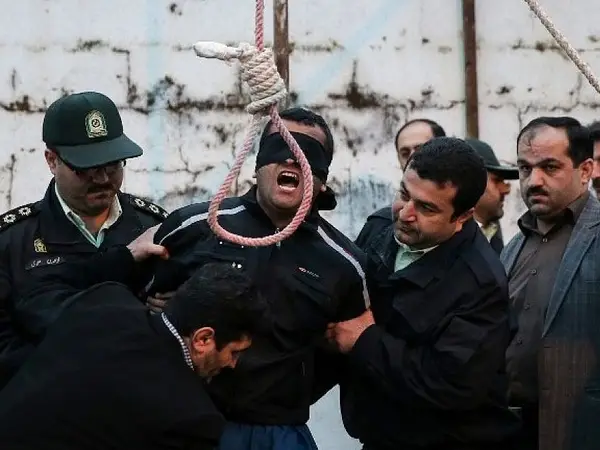In the early hours of Wednesday morning, families of prisoners sentenced to death gathered outside Iran’s largest prison hoping for mercy by the regime but by sunrise their loved ones were hanged.
But in a bitter twist of fate, the prisoners’ families were violently dispersed by security forces using teargas, batons and warning shots, with no chance to say goodbye, or see their loved ones for one final word.
"A family member of one of the prisoners was taken to the hospital after being beaten by the forces and he is in critical condition,” a human rights group cited an unnamed source as saying, the brutal scenes compounding the pain of the families pleading for amnesty for their loved ones.
Three inmates were executed at Ghezel Hesar prison in the city of Karaj while another four were hanged at Rajai Shahr Prison also in Karaj. The charges for the executed prisoners were announced as drug trafficking and rape and have been part of a spree of killings by the Islamic Republic in recent weeks.
The number of executions started to rise after President Ebrahim Raisi – the former head of the country’s notorious judiciary -- took office in August 2021 but the recent exponential spike has triggered concern at home and abroad.
The United Nations said Tuesday that Iran has executed 209 people so far this year, calling the record "abominable". The Annual Report on the Death Penalty in Iran 2021, published by Oslo-based Iran Human Rights (IHRNGO) and Paris-based Ensemble Contre la Peine de Mort or ECPM (Together Against the Death Penalty), said at least 333 people were executed in 2021, about two thirds of whom were during Raisi’s administration. This was up from 267 in 2020.
In 2022, executions rose by about 80 percent, with at least 582 people put to death. Several right groups such as IHRNGO, ECPM, and the US-based Human Rights Activists News Agency (HRANA) described the rise as the authorities’ tactic to "spread fear" among protesters.
A glance at the HRANA’s 2022 reports on Iran's rights violations clearly shows a sharp upward trend in the reported cases since mid-September when the 22-year-old Kurdish woman Mahsa (Jina) Amini died in the custody of the so-called “morality police,” following which protests swept across the country.
Iranian social media users have launched a twitter campaign calling on the regime to stop the executions, particularly of prisoners of conscience. The Persian translation of the hashtag “we are all together” had been retweeted about 300,000 times by mid-Wednesday.
The global community has also been vocal about the exponential rise in the number of executions, with many officials condemning the acts and calling on the regime to halt the hangings.
Two Iranians jailed for insulting religious entities were hanged on Monday, strengthening speculation that the killing spree aims to intimidate people against further protests. Moreover, Iran executed Iranian-Swedish political activist and former leader of the Arab Struggle Movement for the Liberation of Ahwaz (ASMLA) Habib Chaab (Asyud) on Saturday for “corruption on earth”.
Speaking to Iran International, the Canadian foreign ministry called the executions of the three activists hanged in the past few days “appalling,” urging the Islamic Republic to abolish capital punishment.
Australian Senator Jordon Steele-John, a political sponsor of Majid Kazemi -- among four men accused of being involved in the deaths of three IRGC’s Basij militia members during anti-government protests in the city of Isfahan – called on the Federal Government and Australian Foreign Minister Penny Wong “to have an urgent meeting with her Iranian counterpart to do all they can to prevent the execution of Majid, which could happen at any moment”.
On Tuesday, the sentiments were echoed by the UN High Commissioner for Human Rights, Volker Türk. ”On average so far this year, over 10 people are put to death each week in Iran, making it one of the world's highest executors,” she said. And as numbers continue to climb, it looks unlikely to stop any time soon, with the regime doing all it can to spread fear among its people.
